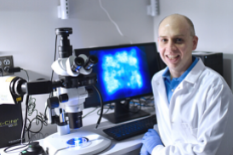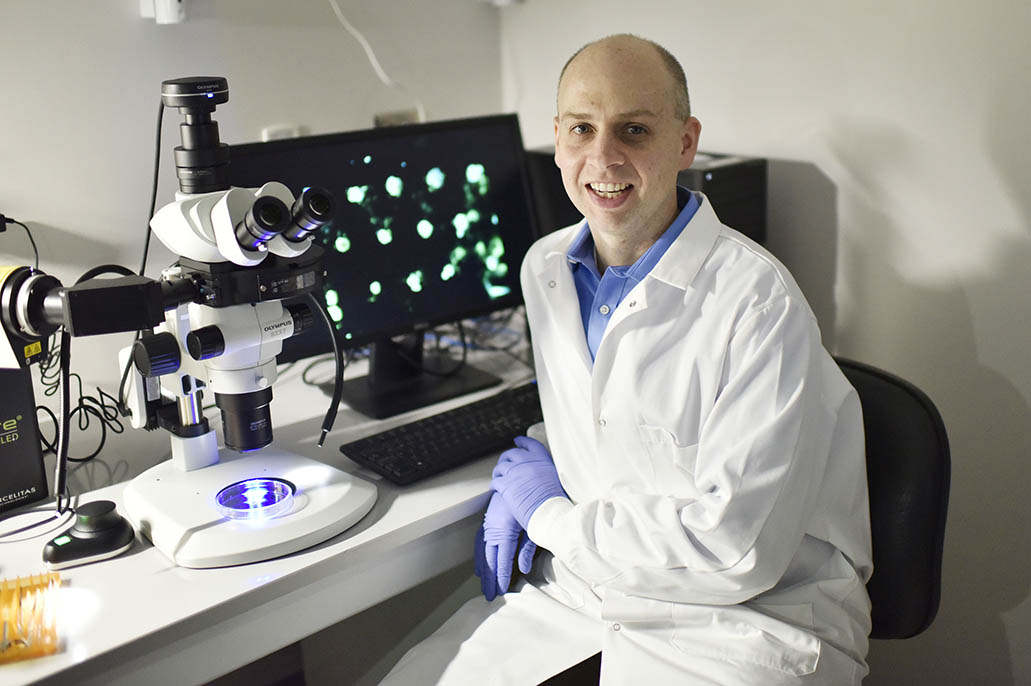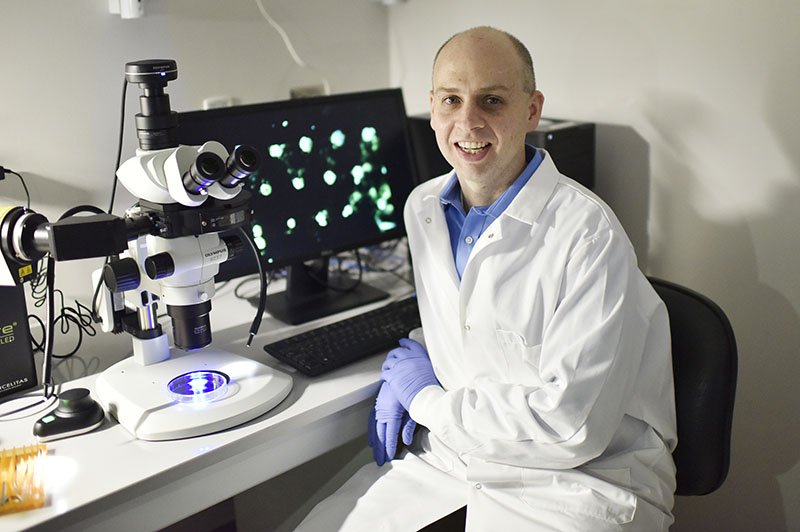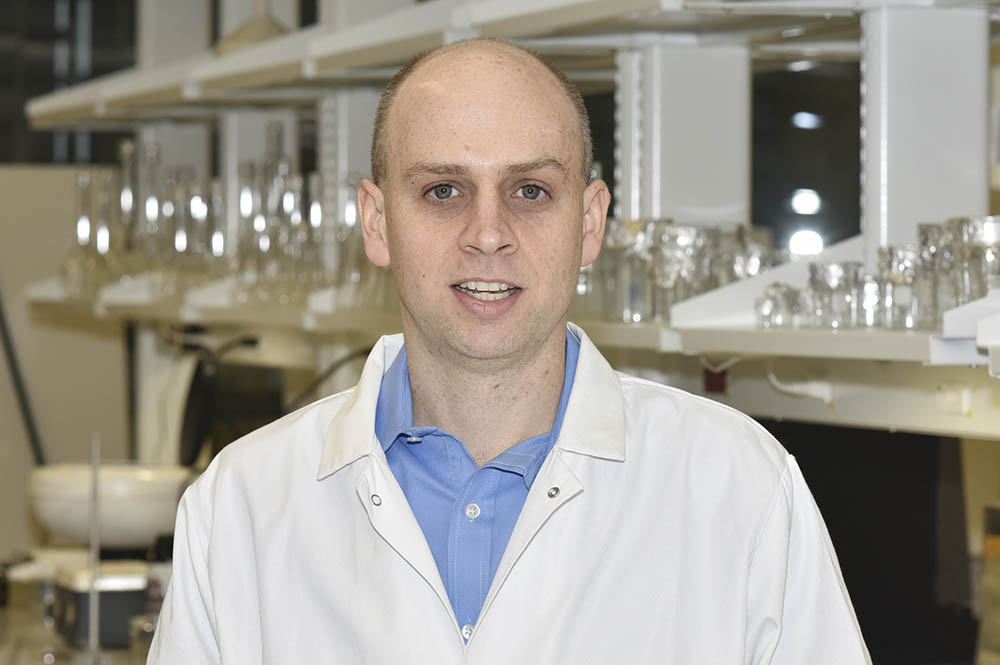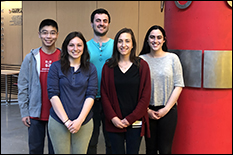News Story
UMD-Led Research Could Point to New Targets for MS Treatments
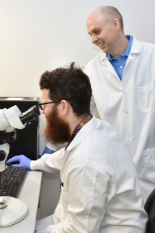
Dr. Robert "Smitty" Oakes (front) and Dr. Christopher Jewell (back)
University of Maryland (UMD) bioengineers reached a new milestone in their efforts to design an immunotherapy strategy to treat multiple sclerosis (MS) and other autoimmune diseases. The team’s findings, published this month in ACS Nano, used nanomaterials to manipulate inflammatory pathways that might one day help slow or reverse MS without compromising a patient’s immune system.
Nearly 2.5 million people worldwide have been diagnosed with MS, an autoimmune disease that causes the body’s immune system to wrongfully attack myelin, the insulation that surrounds and protects nerve fibers in the brain and spinal cord. When this happens, nerve fibers and cells are damaged, leading to a loss of motor function and other neurological complications that greatly impact the patient’s quality of life.
Current therapies for MS non-specifically decrease the activity of the immune system to restrain the detrimental “attack,” but at a cost that leaves MS patients vulnerable to certain infections or illnesses, including some cancers.
Recognizing this, UMD Fischell Department of Bioengineering (BIOE) Minta Martin Professor of Engineering and U.S. Department of Veterans Affairs (VA) Research Biologist Christopher Jewell – along with members of his Immune Engineering Lab – are exploring ways to “turn off” the harmful immune attack that occurs during MS, while leaving healthy functions of the immune system intact. Most recently, the team has been working with specially designed nanomaterials built entirely from immune signals; they hope this unique design can be used to reprogram how the immune system responds to the body’s own healthy cells – or, “self” cells – in the brain and spinal cord during MS.
Funded by a VA I01 award, Jewell and his team found inspiration in how our bodies typically respond to infection. Surprisingly, new studies have shown that some of the defense mechanisms – such as those known as toll-like receptors (TLRs) – our bodies typically use to fight infection go haywire during autoimmune disease and are, in fact, overactive in MS. Jewell and his team decided to target these pathways to block inflammation. Their hope is that, by eliminating harmful cues while delivering helpful myelin self-molecules, they might create an opportunity to retrain self-reactive T cells that attack myelin to instead become regulatory T cells. These special immune cells could enable more specific control of the cells that do damage during MS or other autoimmune diseases, without suppressing the function of normal cells.
“This was a very exciting outcome to us – we discovered that the immunotherapeutics we designed reversed paralysis in a mouse model of MS that mimics the terrible bouts of relapse and remission patients experience,” Jewell said. “This occurred even when we waited to begin treatment until the peak of disease onset.”
Next, Jewell and his team made a bold move: they challenged the animals with foreign antigens to see if the animals were somehow immunosuppressed by the immunotherapy they invented.
In the human body, the immune system detects antigens – molecules that are present on all cells and vary according to the type of cell – in order to distinguish the body’s own “self cells” from foreign cells and pathogens. When functioning properly, the body’s immune system recognizes self cells by their self-antigens, preventing attack. This, in turn, means that foreign substances — such as bacteria, toxins, or a virus — stick out like a sore thumb, enabling the immune system to wage a specific attack to eliminate the intruder.
In cases where a patient receives immunosuppressive treatments to combat the excess inflammation in MS or other autoimmune diseases, the patient’s immune system is also often hindered and less likely to respond to foreign antigens in the same way that an uncompromised immune system would.
Recognizing this, the Jewell Lab challenged the animals treated with the immunotherapies using a vaccine containing a foreign antigen to determine if these animals could still generate normal immune responses. The results were groundbreaking: the research team observed that the mice had normal immune response to the foreign antigens, measuring two core types of immune functions – both antibodies and T cells; this occurred despite the fact that the mice had received immunotherapy treatment to combat the attack of myelin.
“MS is an awful disease that causes a slow debilitation in patients,” Jewell said. “It’s also a disease that is very costly to patients and their families, both financially and in quality of life. We need more effective treatments that are safe and easy to take. Immunotherapies that integrate new technologies to direct and retrain the immune system could enable the ultimate goal of specific and long-lasting therapies. This is something we constantly have in our minds as we work toward better options for patients.”
“The ability of vaccines to eliminate specific targets has transformed the fight against viral and bacterial infections,”said Jewell Lab postdoctoral researcher Robert “Smitty” Oakes, first author of the ACS Nano paper and a VA Career Development awardee. “The value of this specificity is apparent as the world currently fights the coronavirus pandemic, with vaccines illuminating the path forward. However, this specificity has eluded MS and autoimmune therapeutics in the clinic. Achieving this goal of antigen-specific tolerance for MS would revolutionize patient care – similar to how vaccines and checkpoint blockade have revolutionized infectious disease and cancer treatments, respectively.”
In addition to Jewell and Oakes, the following BIOE authors contributed to the paper: alum and former NSF Graduate Fellow Lisa Tostanoski (Ph.D. ‘17), Assistant Research Scientist Senta Kapnick, NSF Graduate Fellow Eugene Froimchuk, and researchers Sheneil Black and Xiangbin Zeng.
In addition to his BIOE and VA appointments, Jewell is a researcher with the UMD Robert E. Fischell Institute for Biomedical Devices.
Full text of the paper titled “Exploiting Rational Assembly to Map Distinct Roles of Regulatory Cues during Autoimmune Therapy” is available online.
Published March 22, 2021
